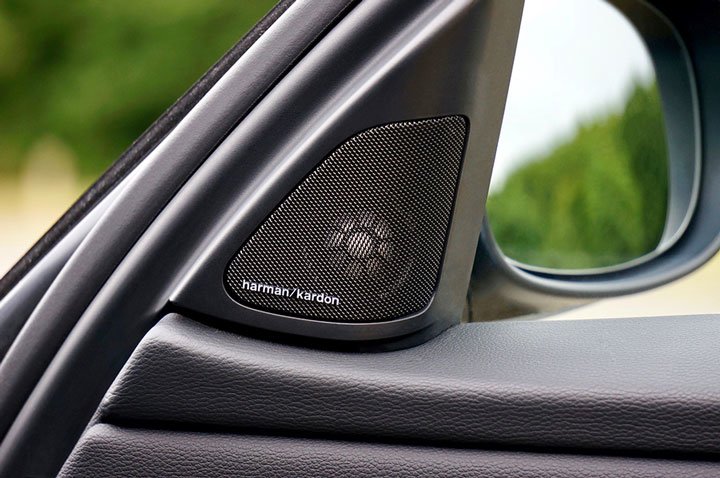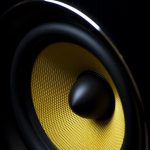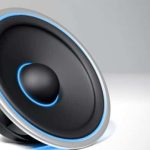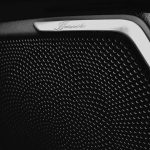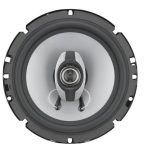Every car owner desires to have the best audio system in their car. Having the best car audio system demands choosing the best speakers. The size of the car speakers you’ll choose will have a huge impact on the sound quality you’ll get in your car. Not all car speakers can fit in your car. If you buy the wrong speaker size, you might end up modifying the existing speaker ports to fit in the new replacement speaker. Thus, it’s important to know the different car speaker sizes that exist in the market today.
As a DIY enthusiast, you might want to install car speakers by yourself, but you don’t know which size to go for. If you’re confused about the right car speaker size for your car, read on through this guide. We have prepared a guide that explains the different speaker sizes that you can find in the market today for your car. Read on to know which car speaker size is ideal for your car. We have arranged the speakers from the smallest size to the largest size.
3.5 Inch Speakers
These speakers offer mid to high-range sound. They’re great for cars with tight spaces and are affordable. Moreover, they consume little power. However, they’re not ideal for low-frequency sound. They’re more suitable for anyone who wants crispy sound but not bass.
The 3.5-inch car speakers are built for compactness. You can use them close to your ears without any problems. They can fit into the dashboard ports of any car. You can also install them anywhere else you would want due to their small size.
4 Inch Speakers
Car owners who like hearing clear lyrics of their favorite songs can go for 4-inch speakers. They’re designed to offer dedicated high and mid-range frequencies. They don’t demand a lot of power and can be used with factory receivers. Due to their small size, they can fit in tight car spaces. Moreover, they’re affordable but are not ideal for bass lovers.
4 x 6 Inch Speakers
Car speakers measuring 4 x 6 inches are a common size in many cars. You’ll find many brands to choose from if you need a 4-by-6 speaker for your car. Since they’re common in the market, you’ll need to select them wisely and only buy a reputed brand.
f you’re passionate about quality sound and music, but you don’t want to break the bank, then this speaker size is built for you. They’re ideal for any average music lover. They fit perfectly into any average sound system. It’s actually possible to add a subwoofer to 4 by 6 speakers for more control of the frequency ranges. You can also use them with a standalone amplifier for enhanced sound performance.
This speaker size is ideal for high and mid-range frequencies. You’ll have limited bass with this speaker size since it has a small woofer cone. Thus, for deeper bass, you would need a speaker with a larger woofer cone.
4 x 10 Inch Speakers
4 x 10-inch car speakers feature a long, narrow shape. They’re commonly found in classic cars. They’re great for installation in spaces where 3.5-inch speakers would look out of place due to their round shape or where 6×9 speakers would look extremely wide. A typical 4×10 inch speaker features a woofer driver and a dome tweeter. While most modern cars come with round speakers, older cars often feature oval factory speakers. Thus, you would want to replace them with oval speakers such as 4×10 speakers.
5 Inch Speakers
Another popular car speaker size is the 5-inch speaker. These speakers are also ideal for both mid and high-range frequencies. They’re known to offer a better sound range than what woofers and tweeters offer. They’re most common in Japanese cars but are also found in other automakers. This size is perfect as standalone speakers for any car. They offer crisp treble and actually have some solid bass, though not as much bass as a bass lover would want.
However, 5-inch speakers may be limited to some car models, especially Japanese cars. Moreover, they don’t stand a lot of shocks and are therefore not ideal for music lovers who like loud and booming music. If you prefer soft sound, rather than booming sound, then this speaker size is perfect for you.
5.25 Inch Speakers
The 5.25-inch speakers are another small-sized speaker for cars. Their small size makes them suitable for use as door speakers, especially at the rear doors. You can install them in almost any car even where space is limited. Most of them come as factory car door speakers, but factory speakers fail to deliver great sound. Thus, you can replace factory car speakers with custom 5.25-inch speakers for enhanced sound.
This site is popular for its versatility. It can fit in different car speaker ports with ease. This makes them ideal for DIY installation. Moreover, this size allows for different sound ranges. They’re able to deliver clear and clean high frequencies. However, they don’t deliver quality low-frequency sound. You’ll only enjoy treble and you’d need to add a woofer to enjoy bass.
5.75 Inch Speakers
The 5.75-inch car speaker is not a common size, but you can still find a high-quality one in the market today. They’re ideal for replacing factory speakers of similar size for better sound quality. They’re designed for mid-range frequency. Thus, you would want to choose a bigger speaker for more bass in your car than a 5.75-inch speaker.
5 x 7 Inch Speakers
The 5 x 7-inch car speaker is a little bit bigger than the 5.75 inch speaker. However, the two sizes are all designed for mid-range sound. This speaker size is not commonly found in many cars and may only fit in some few car models. Luckily, they’re very easy to install. Thus, they’re ideal for DIY installation. With this speaker size, you’ll get high-quality audio without distortion. In case this speaker size can fit in your car, then it’ll be worth buying it.
6 Inch Speakers
Car speakers measuring 6 inches in size are big enough for average car music enthusiasts. They’re ideal for booming and loud music since they can withstand shock from loud volume and car movement. Although they’re bigger than the aforementioned speakers, they’re still lightweight and easy to install. They’re ideal for mid-range sound and a bit of bass. If you’re tired of your factory 6-inch speakers, then consider replacing them with high-quality 6 inch aftermarket car speakers.
6.5 Inch Speakers
Car speakers measuring 6.5 inches are the most common car speaker size. They fit in most cars and are extremely versatile with respect to the sound frequency range. Many car manufacturers design factory car music systems with 6.5-inch speakers due to their versatility. If your factory 6.5-inch speakers are distorting on high volume, then you should replace them with aftermarket speakers of the same size.
This speaker size is commonly installed in the front doors at either side. With this speaker size, you’ll enjoy multiple sound ranges, but you may not find them appealing for bass.
6.75 Inch Speakers
If you want average-size car speakers that can deliver high-quality mid and low-range sound, then you should consider the 6.75-inch speakers. This size fits in wider car speaker ports and is found in most car types. They offer deeper bass than other small-size speakers. Thus, they’re ideal for bass enthusiasts but are not ideal for high-frequency sounds.
If you concentrate more on booming sound rather than hearing the lyrics of your favorite songs, then this speaker size is ideal for you. Consequently, they demand more power to deliver high-quality mid and low-range sound.
6 x 8 Inch Speakers
Another common speaker size for cars is the 6 x 8-inch speaker. These speakers are often installed at the front door. If you’re looking for speakers to boost the bass level in your car audio, then this speaker size is ideal for you. They also handle mid-range frequencies perfectly. However, you may have to modify car speaker ports for them to fit in most cars since they’re not versatile. They also demand more power due to their larger size. You’ll also have to spend a little more to buy this speaker size.
6 x 9 Inch Speakers
If you’re a bass enthusiast, then this is the perfect car speaker size to go for. With this speaker size, you’ll certainly enjoy deep and booming bass without the need for a subwoofer. You can actually have a bass competition with your friends with this speaker size.
Due to their size, they’re more suitable for the rear dashboard. Some car owners modify their front door speaker ports to fit in the 6 x 9 speakers. However, they consume more power than most speakers. They’re rated in the higher price range and this means you’ll have to spend a little more to have them in your car. Nevertheless, they’re worth their price due to their high-quality low-frequency sound.
Also, Read to Learn: Will 6×9 speakers fit in 6×8? Expectations vs Reality!
8 Inch Speakers
Not every car owner likes average or standard sound and standard speaker sizes. There’re many car owners who prefer going extreme when it comes to the size of car speakers and depth of sound. As such, 8-inch car speakers are specially designed for car owners who like extra-large speakers for extremely booming and extremely loud music. They’re the best solution for the deepest bass.
They require a lot of power to perform optimally. Thus, you’ll certainly need a powerful car amp to power these speakers. A stock car stereo without an amp may not be powerful enough to power them. Also, they’re heavier and more expensive than most of the aforementioned speaker sizes. They take up a lot of space and this makes them more ideal for installation in the car trunk.
Other Car Speaker Sizes
When choosing car speaker sizes, you’ll come across tweeters, subwoofers, and woofers. They’re also types of car speakers and vary in size. For instance, car tweeters are the smallest car speakers you can find. They range from 1 inch to 3 inches in size. You can find them as standalone car speakers or part of large speaker systems. Tweeters are specially built to offer high-range sounds. They’re very affordable and can fit on any car since they can be mounted almost anywhere you would want them in your car. However, they don’t give any low or mid-range sounds.
On the other hand, subwoofers and woofers are specially designed for offering low-range sound. They’re ideal for music lovers who like booming and deep bass in their cars. Subwoofers and woofers are similar in many ways, and the only major difference is their frequency range. Woofers cover a wider low-frequency range than subwoofers. A woofer covers a frequency range of 40-2,500 hertz whereas a subwoofer covers 20-200 hertz. Car subwoofers and woofers range from 8 to 15 inches in size. Due to their large size and weight, they take a lot of space and are best suited for installation in the car trunk. They’re also more expensive than standard speakers and consume more power than standard speakers.
When choosing speaker sizes, you’ll also need to choose between coaxial and component speakers. Coaxial speakers, also known as full-range speakers, are speakers that have multiple components combined in one structure. For instance, you can find a speaker that comes with a tweeter and a woofer all in one unit, and this would be a type of coaxial speaker. On the other hand, component speakers are speaker systems with drivers that are split into different units. Basically, component speakers offer more superior sound but are more challenging to install. Coaxial speakers are easier to install but offer less superior sound than component speakers.
You can also read our comparison between 6×9 speakers and 6.5 speakers.
So which car speaker size should I go for?
Now that you’ve discovered the different speaker sizes that exist, it’s time to make a decision on the perfect speaker size for your car. Speaker sizes are usually measured according to the diagonal measurement of their frames and the alignment of holes on the frame. Aftermarket speakers don’t always fit into the factory car speaker holes. While you can get a matching aftermarket speaker size, some sizes may not fit in your car speaker holes.
You can easily know the size that will fit in your car by checking out your car manual. If you can’t find the manual, you can check from the website of your car manufacturer. The manual will most likely have information about the speaker size suitable for your car.
Alternatively, take measurements of the speaker holes in your car to know the exact size. You’ll need to measure the depth, width, and length of the factory speaker hole. You can use a tape measure or any other measuring tool to get the measurements.
The best way to take measurements on the factory speaker ports is by measuring the factory mounting brackets. They’ll give you proper dimensions such that you’ll be able to buy the exact speaker size.
Besides the aforementioned measurement options, you can also use online tools to take measurements of your speakers. Online tools are basically databases containing detailed information about specific speakers. To use these tools, simply check the model of your car speaker and enter the model details on the online tool. You’ll get instant results about the specifications of your car speaker, including the speaker size.
If you’re unable to determine the size of your stock speakers, then seek the services of a professional installer. Upon determining the size of the stock speaker, you can now shop for a replacement speaker of the same size. However, it’s not a must to install a replacement speaker of the same size as the stock speaker. You can still install a larger or smaller speaker than the existing one, but this will require you to modify the existing speaker hole. You can use speaker adapter brackets to fit in a different car speaker size. You can also install smaller or larger speakers by creating new holes or installing them in your car trunk using speaker cabinets.
In the end, the speaker size you’ll choose for your car will depend on your personal preferences, budget, and the kind of sound quality you want. For ease of installation, replace the stock speaker with a matching size of an aftermarket speaker. If you don’t mind modifying the existing speaker holes or creating new speaker holes, then you can go for any car speaker size. You might also like to read about the Types of Loudspeakers.
Michael Evanchuk is a San Francisco-based sound engineer with 20 years’ experience installing, troubleshooting, and repairing commercial, automotive, and household sound equipment. Evanchuk owns an auto stereo center, where he offers highly competitive car audio installation and repair services. He has written dozens of articles on different sound engineering topics, all of which have been published in leading journals, blogs, and websites.

